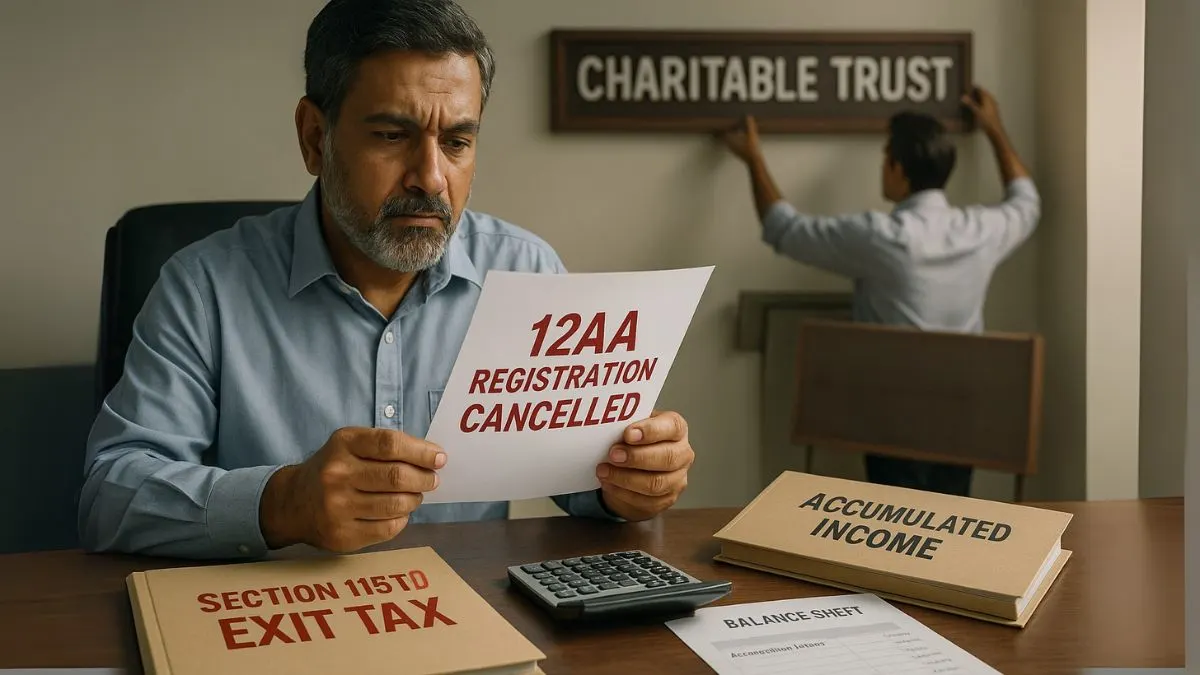
There was a time when charitable trusts & institutions enjoyed significant leniency under Indian tax law, with their noble purposes earning them broad exemptions & minimal scrutiny. However, with increasing misuse of these exemptions, the government introduced a game-changing provision—Section 115TD. While many may not fully grasp its intricacies, the impact of non-compliance can be severe.
Trusts that fail to adhere to tax laws—or worse, attempt to get de-registered—could face substantial repercussions. Understanding this provision is now more critical than ever.
What Is Section 115TD?
Section 115TD of the Income Tax Act deals with the levy of tax on accreted income when a charitable institution or trust ceases to exist, gets converted into a non-charitable form, or violates specified conditions that make them ineligible for tax benefits.
Put simply, if your trust stops being charitable or chooses to exit its exempt status, the government can tax all its accumulated wealth as if it were income. And this isn’t your regular income tax rate—it’s a hefty 30% tax on the total "accreted" value.
Why Was It Introduced?
This section was inserted in the Finance Act, 2016, & it targeted one growing loophole: charitable trusts accumulating wealth tax-free, only to later convert into commercial entities without paying taxes on their corpus.
Before Section 115TD, there was no way to tax this “accreted income” even if a trust walked away from its charitable objectives. This new rule closed that gap.
When Does Section 115TD Apply?
The law kicks in under three specific circumstances:
- Voluntary conversion of a charitable trust or institution into a non-charitable one.
- Merger with a non-charitable entity.
- Non-distribution of assets upon dissolution to another registered trust within the prescribed period.
In all these cases, the trust is treated as if it has earned an income equal to its net assets, meaning the fair market value of all assets minus liabilities.
This amount becomes "accreted income" & is taxed at 30% under Section 115TD, without the benefit of slabs, rebates, or exemptions.
The Calculation: What Gets Taxed?
Accreted income isn’t just the cash in the bank. It includes:
- Land & buildings
- Investments
- Equipment
- All other assets are at fair market value, not book value
The idea is to tax the economic benefit accumulated over the years while enjoying tax exemption.
The tax liability must be settled before the trust winds up or merges. Any delay or non-payment can attract interest & penalties under Section 115TE & 115TF, respectively.
Impact on NGOs & Charitable Institutions
Many NGOs, especially smaller ones, are unaware of this clause. A sudden cancellation of registration or voluntary shutdown without proper planning can trigger a huge tax burden.
Imagine a trust that has accumulated ₹2 crore over the years through donations & grants. If it violates its registration norms & loses its 12A / 80G status, it could face a ₹60 lakh tax bill immediately under Section 115TD.
This is not a hypothetical fear—multiple high-profile NGOs have been caught in similar traps since this law was introduced."
Recent Developments & Court Interpretations
The scope of Section 115TD was further clarified by circulars & court decisions. Tribunals have supported the view that even unintentional violations may not save a trust from this tax, although intent is considered during appeals."
Some reliefs are available if the trust’s assets are transferred to another registered charitable trust within a prescribed period. But this requires clear documentation & proper transfer deeds.
Is There a Way Out?
Yes—compliance is key.
- Ensure your trust strictly follows its charitable objectives.
- File annual returns in Form 10B or 10BB regularly.
- Renew registrations under Section 12AB as required.
- Avoid any merger or restructuring without expert advice.
And if you’re planning to wind up your trust, consult a CA before you make any move. Transferring assets to another registered charitable institution within a set timeframe is one of the few safe exits.
A Quick Real-Life Scenario
Let’s say a hospital trust registered under Section 12A decides to become a private hospital company. Upon conversion, all its accumulated land, donations & hospital infrastructure now fall under “accreted income” as per 115TD. Even if it didn’t earn profits, it will be taxed on the entire asset base. Not planning could mean financial disaster.
Final Thought
Section 115TD isn't just a clause—it’s a watchdog. It exists to make sure charitable status isn't used as a backdoor for wealth accumulation. And while its intent is noble, its execution can be brutal for those unprepared. Trusts must walk the line of compliance with care, or be ready to pay the price—literally.
Need help ensuring your trust or institution doesn’t fall into a Section 115TD trap?
Talk to expert Chartered Accountants now at Callmyca.com & safeguard your charitable legacy before it's too late.











